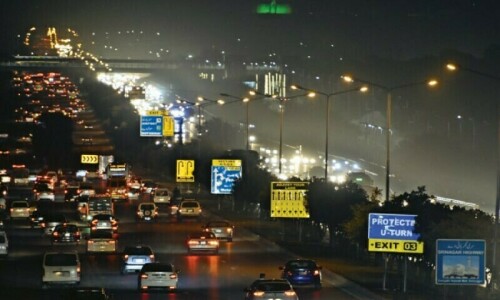ISLAMABAD: The latest Global Consumer Confidence Index survey for the first quarter of 2024 shows a significant decline in Pakistan’s standing compared to five years ago.
Instead of progressing, the country has regressed over this period, losing five years of organic growth and development.
Economic challenges persist, leading to widespread discomfort among the population regarding daily purchases and future investments.
Only one in 10 Pakistanis believes that the country is heading in the right direction, 98pc remain uncomfortable in making major purchases like houses or cars.
The study has been conducted by a market research company, Ipsos, which has been working in 70 countries with around 20,000 researchers. As many as 1,043 individuals from all four provinces of Pakistan, Islamabad, Gilgit-Baltistan and Azad Jammu and Kashmir were interviewed during the survey. Moreover, a comparison with other countries has also been included in the survey report.
98pc respondents not comfortable in making major purchases
Pakistan’s journey shows significant fluctuations. An initial dip during the Covid-19 period in 2019-20 was followed by an improvement in 2021, attributed to effective perception management strategies. However, the recovery was short-lived, with a subsequent downslide in 2022-23 due to political experiments. The IMF standby agreement at the end of the PDM-led government brought a bounce back in the third quarter of 2023 and the caretaker government stabilised the situation, leading to a positive trajectory from September 2023 onwards.
The report claimed that during the current quarter, Pakistan’s global standing remained the lowest, even among emerging markets like Brazil, India and South Africa. Despite facing unique challenges and global crises such as the Covid-19 pandemic, Russia/Ukraine war and Middle East turmoil, unlike Pakistan these economies have managed to improve consumer confidence over the past five years. The data suggested two key lessons: firstly, allowing governments to complete their five-year terms is crucial for political stability. Premature changes in government can hinder consistent growth. Secondly, the survey emphasises the importance of perceptions which can carry more weight than reality.
“The incumbent government, while having an economic reform agenda, should set realistic targets and Key Performance Indicators (KPIs) based on survey data for effective perception management, ensuring sustained and improved confidence among the public and investors over time,” the report stated.
The survey, based on interviews, highlights that only one in 10 Pakistanis believes that the country is heading in the right direction. Males are twice more optimistic than females. Despite still being low, there’s stability in optimism since the caretaker government took over last year.
“Economic problems continue to top the list of worrying issues for Pakistanis. However, a slight decrease can be seen in the perception of inflation as the most worrying issue since fourth quarter of last year,” it stated.
As many as six out of 10 Pakistanis believe that the economic condition country is weak. People from lower socio economic classes are even more pessimistic. Three in 10 Pakistanis expect the local economic situation to improve in the next six months, while four in 10 anticipate their personal financial conditions getting better in the same period.
“Only one in 10 Pakistanis shows confidence in future savings and investments. Nevertheless, 98pc of Pakistanis remain uncomfortable making major purchases like homes or cars. Six out of 10 Pakistanis claim to personally know someone who lost their job due to economic conditions. Five years ago, this perception was half. Confidence in job security has remained unchanged since the last quarter with the majority (88pc) still expressing lower confidence,” it added.
Published in Dawn, March 16th, 2024














































Dear visitor, the comments section is undergoing an overhaul and will return soon.